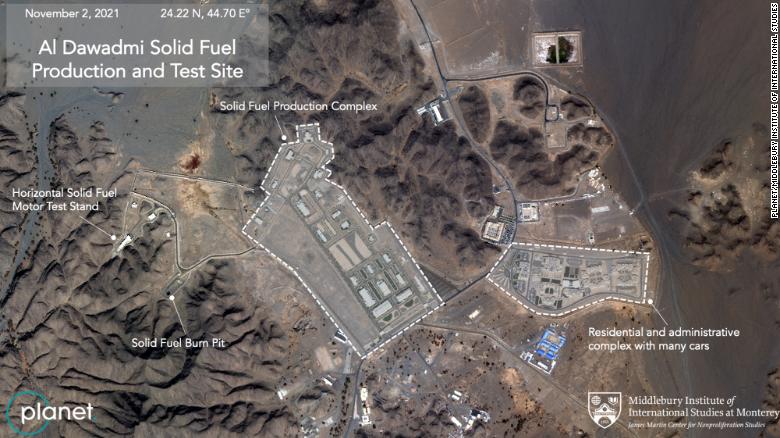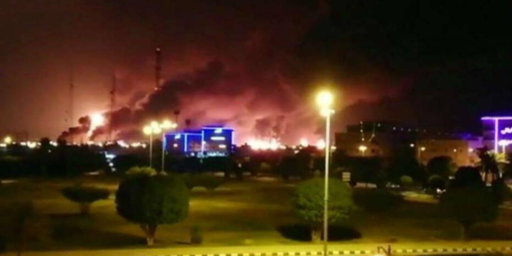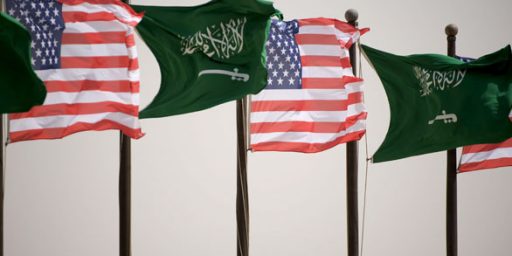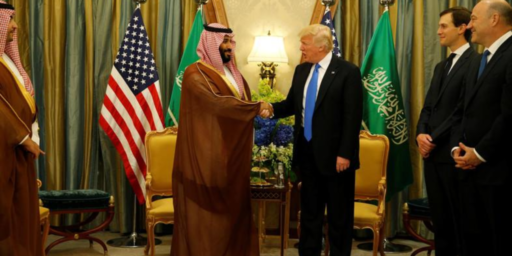Saudi Arabia Building Ballistic Missiles with Chinese Help
Our ostensibly ally is working with our chief adversary against our interests.

CNN (“CNN Exclusive: US intel and satellite images show Saudi Arabia is now building its own ballistic missiles with help of China“):
US intelligence agencies have assessed that Saudi Arabia is now actively manufacturing its own ballistic missiles with the help of China, CNN has learned, a development that could have significant ripple effects across the Middle East and complicate the Biden administration’s efforts to restrain the nuclear ambitions of Iran, the Saudis’ top regional rival.
Saudi Arabia is known to have purchased ballistic missiles from China in the past but has never been able to build its own — until now, according to three sources familiar with the latest intelligence. Satellite images obtained by CNN also suggest the Kingdom is currently manufacturing the weapons in at least one location.
US officials at numerous agencies, including the National Security Council at the White House, have been briefed in recent months on classified intelligence revealing multiple large-scale transfers of sensitive ballistic missile technology between China and Saudi Arabia, according to two sources familiar with the latest assessments.
The Biden administration is now confronted with increasingly urgent questions about whether Saudi’s ballistic missile advancements could dramatically change regional power dynamics and complicate efforts to expand the terms of a nuclear deal with Iran to include restraints on its own missile technology — a goal shared by the US, Europe, Israel and Gulf countries.
Iran and Saudi Arabia are bitter enemies and it is unlikely Tehran will agree to stop making ballistic missiles if Saudi Arabia has begun manufacturing its own.
“While significant attention has been focused on Iran’s large ballistic missile program, Saudi Arabia’s development and now production of ballistic missiles has not received the same level of scrutiny,” Jeffrey Lewis, a weapons expert and professor at the Middlebury Institute of International Studies, told CNN.” The domestic production of ballistic missiles by Saudi Arabia suggests that any diplomatic effort to control missile proliferation would need to involve other regional actors, like Saudi Arabia and Israel, that produce their own ballistic missiles,” Lewis added.
That Saudi Arabia has assessed that it makes sense to have its own arsenal is not unreasonable given the near-certainty that its chief enemy will become a nuclear power. Still, this complicates US and international efforts to contain the spread of nuclear weapons and will further destabilize the region.
While the Kingdom’s dominance of OPEC and willingness to play ball on oil pricing made them an important partner for decades, our move to energy self-reliance and their support of international terrorism and spread of hateful ideology has changed the equation. It’s long past time to acknowledge that Saudi Arabia is an ally in name only and is actively working against our interests.






Unmentioned in your commentary or in the CNN quote: the Saud family won’t run Saudi Arabia forever. What happens to the country’s missiles and, possibly, nuclear weapons when that happens Those who replace them are unlikely to be liberal democrats.
Follow up question: if it’s against our interests why are we helping the Saudis in their war against Yemen?
@David J Schuler:
Because a lot of people in various capital are too dense to realise what you just said: the al Saud are unlikely to be there forever.
(Especially if/when oil demand begins to slacken off.)
I’ve mentioned in passing here a few times about the (unconfirmed but quite likely IMO) Saudi “option” on the Pakistani nukes.
OTOH, if the Saudis are persuadable, it might be useful as something extra to offer Tehran in a negotiation: “You freeze the nukes, we get Riyadh to freeze the missile program”
Are you sure they’re not acting like a regional ally? Doesn’t Israel do things like this a fair amount and get away with it? And doesn’t SA have strong business connections to us, and an army of lobbyists on Capitol Hill? We don’t have allies; we have craters full of sunk costs spread around the world.
SA is an ally because we hate – for reasons that really don’t make sense now if they ever did – Iran even more and because we can’t get rid of the idea that we can somehow control outcomes on the other side of the world. Both SA’s and Iran’s leaderships might be in exile, prison or dead within the decade but they’re in charge right now, and right now they have made calculations that having nuclear weapons serves their national interests.
I think if we really wanted to have a positive impact on this particular dick-measuring exercise, we might want to encourage or even set up the framework for detente. It shouldn’t be too hard for China to go along with that: they’ve got sunk costs in this region too.
@JohnSF:
And here’s an example of what I refer to in my first post: the idea that we can control things that another country wants to do based on what it decides in its own self-interest. I don’t think it’s too much to say that Iran’s and SA’s leaderships understand each other a lot better than we understand either of them. And perhaps they even trust each other more than either of them really trusts us – we haven’t exactly been a model of calm restraint in the region for the past twenty years.
Note: “trust” doesn’t mean “like”. Russian/American detente worked because we put on our rationality hats and didn’t get (too) bogged down in chauvinism and provocation. It can be done!
@Not the IT Dept.:
Well, at least in part that’s because the Iranian government decided that the US was an enemy for it’s own reasons.
And was unable to refrain from pretty steady policy of poking Arabia, and Israel (and quite frequently Egypt) in the eye.
Detente would be nice; but does Iran want a detente that includes bridling its regional ambitions/interests?
Interesting thing is that China seems happy to play both sides of the divide in this.
Their interest might be just developing their network of inter-governmental relationships.
Or possibly keeping the region on a simmer in order to pin the US down.
@Not the IT Dept.:
Depends what leverage you have.
The House of Saud might consider itself rather exposed if the US were to withdraw its protection.
Of course, another country will generally decide things in its own perceptions of interest (which may not be as rational, at least from the outside, as might be hoped).
But you can also make plain that your reactions to their actions may also affect their interests, for various degrees of good or ill.
One element to Soviet-American relations was that each sides self-interest included knowing the others potential interest, capacity, and intent, in certain circumstances, of annihilating them.
That is one example of shaping outcomes on the other side of the world, albeit a rather extreme one.
@JohnSF: In past discussions I’ve had with people on nuclear issues involving ME countries, the prevailing argument was “you can’t trust those people to understand the nuances involved; that’s why we gotta stop them from having stuff.” Taking that as a good faith argument [insert eyeroll here], is there any reason to believe that “enlightened Western nations” can exert pressure on “these Bedouin savages?”
@David J Schuler:
That support — regardless of administration — and the underreporting of the horrific results of it, is one of the greatest long term failing of our foreign policy.
@David J Schuler: @mattbernius: We tend to view too much of the region in terms of Iranian influence and see the Houthis as Iranian proxies. President Biden announced an end to our support for offensive operations there shortly after taking office. It’s not clear to me, though, to what extent we’re still supporting the Saudis in other ways.
@JohnSF:
And if the next president simply undoes that deal?
The extreme US partisanship is affecting other countries, too.
There’s more going on here than just Saudi vs. Iran. The big as-yet-unmentioned is Turkey which is contesting with SA for leadership of the Muslim world. As I understand it we have Turkey and Qatar on one side, SA and the UAE on the other, and Iran on a third side along with Hezbollah and the Houthis and Qatar a bit. Other countries are hoping to exploit/survive the conflict.
Interesting is Israel’s position. They have had good relations with Turkey over the years, but also have this new UAE deal. Three dimensional chess with Arabs, Persians and Jews. We may be out of our depth in this game.
@Michael Reynolds:
Good points, but no one has mentioned Egypt. Until Turkey decided it was never going to be considered a European state and turned back toward being a ME state, Egypt had been considered the preeminent military power. For internal reasons, they have stepped back from that role, but at some point they will rejoin the fray and on which side will define the power balance.
@Michael Reynolds: Not to disagree particularly since I admit I know very little about the mid-east but what does it mean to be ‘leader of the muslim world’?
It’s a phrase I’ve heard fairly often and don’t know what the leader of the muslim world gets to lead, ya know?
@Just nutha ignint cracker:
Generally speaking, people would rather they, and their families do not die.
And, for some almost, or occasionally, more important, that their causes or countries survive and preferably prevail.
Most people, even those considered fairly fanatical, if faced with imminent destruction or overthrow, may decide their goals can be set aside, for the time being, until their “inevitable” final victory.
For the less fanatical, just inconvenience may serve.
As for the al Saud elite, the threat of losing their rule and their riches would probably suffice.
The wahhabi ulema side of the Saudi Arabian dyarchy might be a bit more mulish, but the prices can probably persuade them.
One way or another.
@Kathy:
Yes, one reason why Trump and the Trumpublicans are massive detriment to US policy objectives.
Mind, the US has always had something of a rep for diplomatic unpredictability.
But Trumpism turns it up to 11.
So the other parties may be amenable to freezing their actions, but not dismantling their capacities to resume them.
This is surprising news to me sense I live in my own little world. Is it possible the Saudi’s have only been using us, and really don’t like us? We know they had nothing to do with 9/11 and have always been our alley. So why this, now? And China, Nixon rightly proclaimed that a good trade relationship would insure a strong friendship with China, so we have nothing to worry about with them, either. Me has a sneaking suspicion that these two countries may have only been pretending to be our friend while they were making other plans for all these years. Is that so crazy?
@James Joyner:
I think that’s backwards, based on the “all those Shi’ites are in cahoots” view held by the Saudis. I think that real Iranian involvement was mostly AFTER the Saudis attacked the Houthis and we began aiding the Saudis.
@JohnMcC:
Immediately, bugger all.
Longer term, possibly a lot, possibly bugger all squared.
Parts of both the wahhabi ulema and some of the Iranian mullahs (and Pasdaran) have ambitions, IMO unrealistic ones, of re-unifying Islam on their terms, and of prevailing over various inimical “outside” forces within the Muslim world.
With Israel providing a handy “lowest common denominator” stand-in cause for anything more constructive, or divisive, depending on how you look at it.
Of course, most of the people of those countries, and in Suadi Arabia most of the al-Saud, care little for such dreams/nightmares.
But that’s often failed to halt sufficiently determined elites from dragging countries to disaster in the past.
@Michael Reynolds:
It’s even worse than that if such a thing be possible. The Turks are irredentists, the Iranians are radical Muslim millennialists, and the Saudis are cynical authoritarians, backed by a radical Muslim (albeit Sunni) faction.
@HelloWorld!:
Some like you, some dislike you.
Same goes for a lot of countries.
Same goes, these days, for a lot of the USA hating the USA, for that matter.
And Nixon and Kissinger were never much interested in trade with China.
Just in leveraging their antagonisms with the Soviet Union to American advantage.
@mattbernius: The fact that people here believe we are “helping” SA shows the long term failing of our foreign policy reporting.
SA would be conducting operations in Yemen regardless of what we do. They do not give 2 shits about collateral damage or civilian deaths. They’d soon as bomb a wedding if it were one person there they wanted to kill. The rest? Well sucked to be them. They’ve accepted our information support to minimize collateral damage at OUR request.
The US is helping polish a turd on one end and on the other end, the same shitheads that are moving into Afghanistan are using the ungoverned space in Yemen as cover to continue their operations. The US has no official beef with the Houthis. They are a sometimes proxy to Iran but have and will tell them to pound sand up their ass when it doesn’t suit their interests.
The media environment we have makes almost everything the US does foreign or domestically damn if you do–damned if you don’t. SA bombs a wedding–The US should have stopped them (even though we can’t). Give them info that minimized deaths to non-combatants (and helps rid Yemen of some very seedy people)–and the US is aiding war crimes.
@JohnMcC:
You’ve heard of the Great Cat Shepherd? The Supreme Organizer of Colicky Babies? The Iron-fisted ruler of Democrats? Much the same thing.
Everyone around the world knows the obvious except for the America public. The US has no appetite for foreign intervention anymore. 1st and 2nd world countries do have intelligence apparatuses that understand the political climate in America. Democrats are the domestic party–there isn’t a fight anywhere under any circumstance (sans invading America) that they will sign up for. Republicans used to be the Foreign policy party. Trump shitted on almost every foreign alliance we have and cemented the Republicans as ALSO the domestic party. Who or what are they down to fight for except Donald Trump and migrants?
All of our allies and partners understand that they have to take care of themselves now–America is not coming to their rescue. SA would be fools to not have Ballistic Missiles when Iran (and Israel) have them. While they would be content to write us a check to continue their protection—there isn’t even appetite in America for THAT anymore. Its, “Bring all the Troops” home season in America. That is, until the new multi-polar world that emerges doesn’t have the same freedom of commerce it did under the Bi and Uni polar worlds that had unprecedented prosperity for Billions.
This is like the Anti-Vax conundrum. Our foreign policy concept is a victim of its own success.
@HelloWorld!:
The American people do have some genuine ‘friends’ in the world, the Brits, the Irish, the French on alternate Thursdays, Italians, Greeks, Portuguese, Aussies – in other words countries that have a significant emigrant populations in the US or like us are former British colonies. And we have allies which are mostly the same people plus Japan and South Korea. Then there’s Canada which has no choice but to get along with us, and Mexico which is less an ally or a friend and more a helpless whipping boy.
But all countries look out for themselves first and second and third and somewhere down around 12th level, may show concern for friendship. Money and power, it’s all about money and power. Saudi Arabia is not a friend. It will never be a friend. But we use them and they use us and the world goes round and round.
@JohnSF and @MichaelReynolds
I think your both saying the world is complicated, yet not much different from how we behave ourselves. I honestly have no concept as to how we maintain a balance with international relations and not kill each other in world war. I keep hoping nuclear weapons and missiles are just a myth used to keep the world in line, but maybe it’s the actual possibility that does that.
@HelloWorld!:
For most of the 20th century the Saudis could count on the US to come to their aide, if needed. In those days the US was considered highly stable.
We are losing that image. There are wild swings between administrations and we are electing populists now, recently a greedy buffoon. It’s to be expected the Saudis would become less confident in the relationship.
@dazedandconfused: Excellent point!
@Michael Reynolds:
Is something stopping you from bringing back CA, AZ, NM, NV, and CO ? We’d let you keep Texas an Utah.
@Jim Brown 32:
American may lack the appetite for intervention.
But I’d guess are enough people in the senior levels of the state and the parties who understand that the US still has some essential interests.
One of those being the Gulf.
While the oil continues to flow as a vital element of the global economy, it’s ceasing to flow would produce a global economic collapse.
The US is better placed to withstand such a shock than most, given its domestic hydrocarbons capacity.
But the resultant loss of almost all exports would still be difficult to endure; 10% GDP is a lot, especially when that section tends to be large enterprises that produce high rewards for employees and investors.
Even if it does not cease to flow its control by an adversarial Power would immediately rupture you alliance systems, and in the medium term lead to the end of the dollar as the primary global currency.
That currency advantage, and the massive recycling of dollar oil purchases via the US financial system, is a critical element of US economic advantage.
A US that could no longer effectively deficit finance at will would have enormous implications for American living standards and politics.
I think buying Chinese weapons is a good thing to add a bit of a very clear, very visible separation. I’d rather they were buying planes than missile tech, but I think the clear separation of our interests and breaking the “they’re bastards, but they’re our bastards” excuse is probably a net benefit.
Can we get the Israelis to buy some Chinese weapons?
@JohnSF: All true indeed. However, we are in the tail wag dog chapter of America. We won’t do anything proactive and what we can do will be dictated by either Party’s mob. Hopefully when we exit this chapter we’ll be in a position to salvage something of our former standard of living.
@Gustopher:
The thing is, it’s the putative Saudi missile manufacture capacity that is new.
The Chinese missiles are not.
They first bought around 50 (?) back in the 1980’s.
And the more accurate, solid fuel (i.e. capacity for rapid launch in emergency) DF-21 in 2007.
Possibly. Numbers uncertain.
In other words, it’s not as big a deal as you might think.
As far as separation of interests goes, so long as the oil flows out and the money flows in the US cannot cut Arabia loose.
The supply of oil and the recycling of the dollars paid for it are critical to both the global and the US economy.
You can as easily disconnect as a man can lose weight by sawing off a leg.
@Gustopher:
Perhaps not.
But China has certainly purchased military systems from Israel.
Trade has tapered off due to US pressure, but in 2004 the United States-China Economic and Security Review Commission stated, “Israel ranks second only to Russia as a weapons system provider to China.”
The world is a messy place, and most countries prioritize their self-interest.
@Jim Brown 32:
Perhaps not proactively
But if/when a full scale Gulf crisis erupted, IMO intervention would probably be forced.
I genuinely think a non-reactive President would be looking at impeachment (at best).
Even if it took imposing a domestic state of emergency to weather the storm of evicting him from office.
In all seriousness, this is the sort of 1930’s level vital interest hit that has the capacity to cause internal violent regime change.
Its old “chief enemy” had nukes for decades, without prompting the Saudis to get missiles. It’s not apparent how having missiles is any kind of deterrent to a nuclear power anyway.
Saudi Arabia spends enormous amounts of money on its military; more than South Korea, France or Russia, on some reports. It might as well have some missiles too. The Gulf States have proven again and again they are much better at buying hardware than at using it.